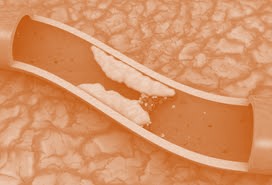Cholesterol Lowering Drugs Barely Help and Don’t Clear Arteries
Most Americans believe that their cholesterol lowering drugs are the modern fountain of youth. They also conceptualize that these drugs clear out their clogged arteries. We became critics of these drugs when we saw them harm stem cells growing in culture in our patients. So do cholesterol drugs clear arteries? Are they any good? Can you get better effects from just eating certain fruits?
First cholesterol drugs have very tiny and only barely measurable positive effects. Surprised? Well the 5 year impact of taking these drugs is only about a lousy 1 percent decrease in the risk of having a heart attack. However, the Pharma companies claim the relative risk, so they compare a 3% death rate in one large group not taking the drugs to a 2% rate in the group on the drugs and report that embarrassingly small side effect as a massive 1/3 drop in relative risk! It’s very deceiving and hard to believe that the FDA allows them to get away with the claim, as it confuses doctors and patients alike. In fact, based on one study, you can better heart protective effects from eating blueberries!
A new study just published helps to put the puny positive benefits in perspective. The study looked at the degree to which arteries were clogged before and after 2 years of being on cholesterol drugs. They found that the patient’s arteries became no cleaner or less clogged as a result of the intensive use of the drugs. In fact, death or illness in the large groups of patients wasn’t even linked or associated to the “bad” cholesterol number seen in the Madison avenue commercials. You know the one where the handsome CEO looking guy is at the pool and looks like he has it all together, but they then show him doing a belly flop dive because his bad cholesterol is too high. According to this and other studies, that number (which is what cholesterol drugs lower), isn’t much associated with an increased risk or death and lowering bad cholesterol doesn’t seem to be associated with living better or longer. In fact, in this study (and others), a measure of body inflammation (CRP) was a better predictor of a heart attack.
The upshot? Cholesterol drugs are more Madison avenue hype than reality. In addition, their negative effects on stem cells causes me not to recommend them to my patients. Perhaps some of these negative effects on cells is now starting to be recognized. For example, this week a study was published showing a new side effect, the drugs doubled the risk of breast cancer in women. Add this to the studies showing negative effects of cholesterol drugs on muscles, nerves, joints, and ligaments and you seem to have a no brainer.

If you have questions or comments about this blog post, please email us at [email protected]
NOTE: This blog post provides general information to help the reader better understand regenerative medicine, musculoskeletal health, and related subjects. All content provided in this blog, website, or any linked materials, including text, graphics, images, patient profiles, outcomes, and information, are not intended and should not be considered or used as a substitute for medical advice, diagnosis, or treatment. Please always consult with a professional and certified healthcare provider to discuss if a treatment is right for you.
